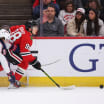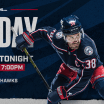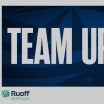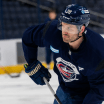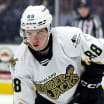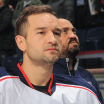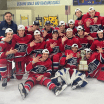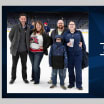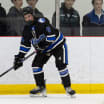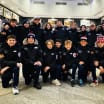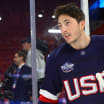Brad Larsen wears the remnants of his two battles with cancer all over his body, but the one Blue Jackets fans will be able to see during the month of November is on his chin.
The CBJ head coach is sporting a handlebar mustache this month, part of the annual Movember celebration that takes over hockey locker rooms. Each year, the fundraiser encourages men to grow mustaches to raise awareness for men's health issues, including the rise of prostate and testicular cancers.
It's become a big thing in the hockey world, and Larsen is always willing to do his part.
Hockey Fights Cancer has a special meaning for Larsen
Blue Jackets head coach hopes his battles with cancer can inspire others
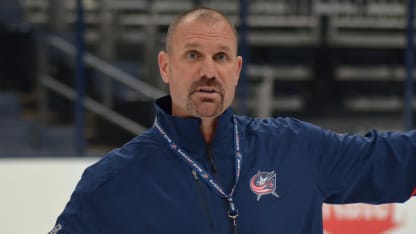
"My kids love it," he said of this month's choice of facial hair. "My wife, I don't know if she loves it as much as I do. But you have fun with it in Movember. I think it's a neat thing that you try to have some fun in a tough situation."
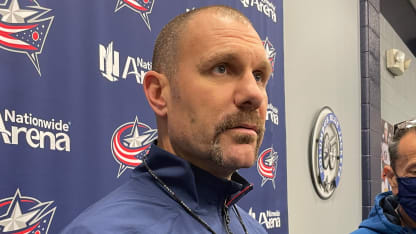
© BLUEJACKETS.COM
And if anyone knows how tough the situation can be, it's Larsen. He has been the picture of health in a lot of ways, a high-level hockey player in his teen years who would make it to the NHL at the age of 20 in 1998.
But life has a funny way of dealing out adversity, and Larsen found that out firsthand in 2007 when he shockingly found out he had melanoma. Then in 2010, another battle arrived, as Larsen was diagnosed with testicular cancer.
He's now a decade out from those circumstances, but he also admits they've gone a long way in shaping his life and his mind-set. And Larsen is quick to point out he's far from the only person in the world who has been through the cancer fight, either as a patient, a survivor or someone close to someone who is.
So as the Blue Jackets get ready for the team's annual
Hockey Fights Cancer Night
, to be held tonight when the team hosts Washington, Larsen isn't afraid to tell his story. It's not because of ego but because he hopes sharing his experience can somehow help others in the never-ending battle against something that impacts us all.
"It's a disease that they've made great progress in, but it's affecting so many of us," Larsen said. "How many of us don't know either a good friend or a family member that has cancer in their life, whether it's good or bad news. Right up until this very day, we know people that are in the fight right now.
"So it's going to be a great night to draw awareness and attention, but there's also a heavy heart in a lot of those situations because you know some of them are in real tough spots."
His Experience
Larsen's own cancer fight began somewhat innocuously. He felt fine and didn't realize there was an issue, especially as he was coming off two solid seasons with the Atlanta Thrashers, including a combined 134 games played at forward.
Larsen was at preseason physicals in 2007 when there was a wait for a doctor, and the team dermatologist was standing nearby. Why not get checked out, he thought?
It turned out to be one of the smartest decisions of his life.
"Really with the melanoma it was just by chance," he said. "It was an optional thing at our physicals. It had never been provided, having a dermatologist there. I was waiting for ortho. There was a line, and I said, 'Why not?' Had I not, who knows? I was teetering on that stage three (cancer) and getting into a real critical area where it could have been very, very serious.
"My trainer called me in two days after I had my physical and in a very serious tone and face said, 'It's not good.' Of course, your mind goes in a lot of different directions. I had about three hours until I heard from them, so that was a long three hours of just being by myself. I didn't share it with anybody, I just wanted to hear what they had to say.
"They said, 'Come down right away.' I did, and I was on the surgery table within an hour and a half when I got there. It was serious enough we had to take care of it right away. But once they did the biopsy, they said, "I think we caught it early enough that we're gonna be OK.' That was good."
After his recovery, he'd be back in the fight three years down the road in the summer of 2010. It was Larsen's final year playing professional hockey, skating as the captain with Portland of the AHL, when he discovered a lump on a testicle as the season neared a close.
Larsen's doctor immediately expected cancer, and that was the diagnosis. As soon as the team's season ended in the first round of the AHL's Calder Cup playoffs, Larsen was back under the knife, then underwent radiation as part of his treatment.
"We were going into the playoffs and I didn't let anybody know," he said. "My wife knew, obviously, and that was it. It's funny, you don't want to be a distraction or whatever, so I went into the playoffs. We got beat in the first round, which was good. Then I was on the operating table on my daughter's first birthday.
"It was tough, but again, you have that athlete's mentality at the time where you just want to know, 'OK, what do I need to do moving forward?' And again, the news that I got was good -- 'We caught it early, and there's a real good chance you're going to be OK.' You just kind of attack it from there."
As he looks back now, Larsen uses the word "simple" to describe his treatments. It's not because they felt that way at the time but because he saw and has seen the impact cancer treatments can have on others.
"It didn't feel simple in the moment, but looking back, having melanoma, we caught it early and I was very fortunate," Larsen said. "And then with testicular cancer my last year of pro hockey, it was just going through radiation, and that was a struggle. But then you hear about the patients that are going through hardcore chemo and what that does to your body. This month is really about focusing on others and what they are going through rather than myself."
His Message
It is hard not to feel that way for someone like Larsen, especially as the years go by, and it has to be amplified by the fact his position often puts him in contact with those continuing to go through the worst parts of the battle.
Each year pre-pandemic, for example, the Blue Jackets designate a number of children fighting the disease as the team's pediatric cancer heroes, with those going through such a difficult struggle hosted by the team and honored as part of the Hockey Fights Cancer celebration. In addition, each year the team visits cancer patients at Nationwide Children's Hospital -- always one of the most emotional days of the year -- and tells the stories of youngsters going through the battle.
It's hard not to feel the weight of what's going on when you take part, especially given the perspective Larsen has.
"You almost feel selfishness of how easy mine was and how hard it is for a lot of people, what they go through," he said. "You see kids, and being a parent now and you watch -- we've done the cancer visits, and I remember doing those when I was single and it was always those awkward moments. You don't know what to say, you don't know how to try to cheer them up. You're chasing your words very wisely, or trying to anyway.
"But now being a parent and you see the parents, it just breaks your heart because you're helpless. There's nothing you can do other than love on them, so there's a lot of these situations going on and my heart just aches for them."
At the same time, Larsen is in a position where he knows he can make a difference. That's especially true in the area of men's health, as he had two cancers that men in particular don't always think to get checked for -- or often push aside if they do notice anything wrong. His message is that there's no shame in putting ego aside and going to the doctor, something that's hard for many men to do.
And in general, his hope is that telling his story, as someone given somewhat of a spotlight, will help others ease the mental burden of going through their own situation.
"I just like to be honest and truthful because I think it's a responsibility of all of us," Larsen said. "If you can share, it helps. Don't be afraid of it. Don't be shy about it. There's nothing to be embarrassed about. This is life. And it's amazing, once you share something like that, how many people come forward and talk about it. There's almost a relief when they talk about it because they know they're not alone."
There are certain things that you can't know about how cancer will impact you until you go through it. There's the shock and the fear that comes with the initial diagnosis, the trials and tribulations of treatment, and the inspiring moments when people you never expect go out of their way to keep you in their thoughts.
It stays with you for years down the road and makes you who you are, something Larsen is quite familiar with as he's looked back on his journey. And it's something that inspires him to continue to make a difference for those who are in the fight of their lives.
"It's changed me a lot," he said. "And I think for the better. It's funny, you go through some of this stuff and you hear 'Cancer.' It's a shock, there's no question. But how you choose to handle it and deal with it, I think that's real important. I was so blessed to have the support system I had and the people around me and doctors and friends and family, the hockey community.
"Not everybody has that. They don't. If there is an opportunity for us to support others who don't have that, that's our responsibility too."


